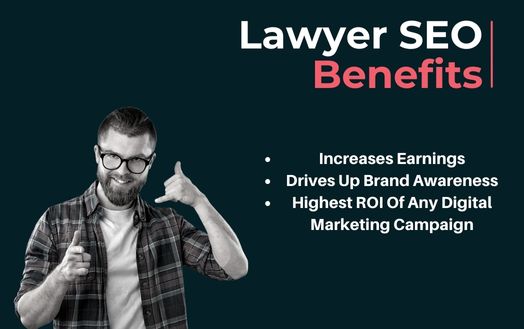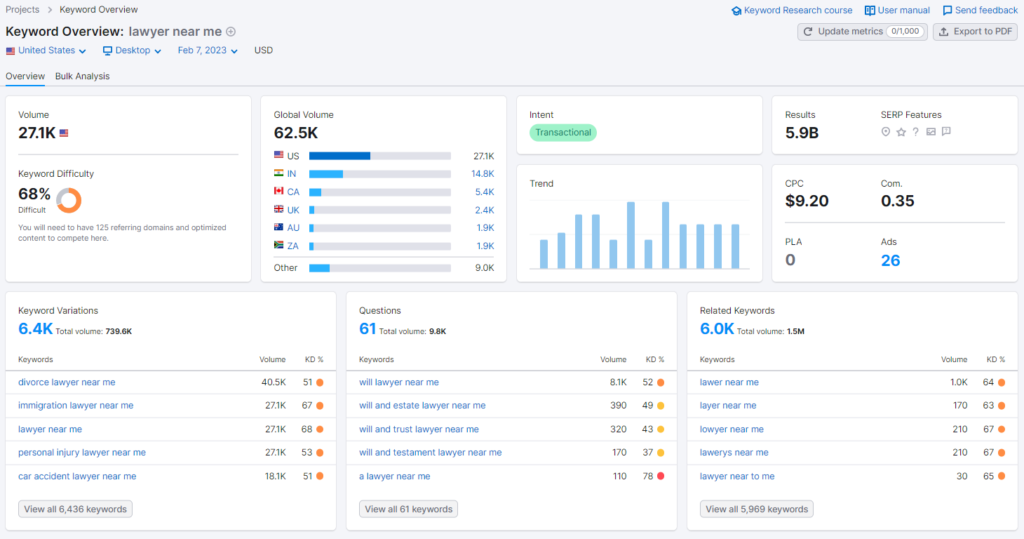Lawyer SEO - The Ultimate Guide To SEO for Lawyers
Search Engine Optimization (SEO) refers to the process used to optimize content relevance, technical configuration, and link popularity to increase visibility, popularity, and relevancy. As a result, search engines rank the pages better.
Search engines appreciate SEO practices that are beneficial to page ranking and user search experience. Excellent practices include meta descriptions, relevant keywords in titles, headlines, and descriptive URLs, among others. Search engines enable users to get what they are looking for on the internet. A law firm can direct traffic to its page if it comes up on the first page. Search Engine Optimization orients the website such that it receives more traffic on a search engine results page (SERP).
The aim is to rank the page at the top of Google search results and allows you to reach the target audience.

People go to the internet when they need something like attorney services. The law firms that come top of the search results have a higher chance of being contacted. A law firm can reach the top of search pages if the website is optimized for search engines. For example, a law firm can rank for keywords such as DUI or criminal attorney to emphasize your services.
Adding location to your keywords can also boost visibility because most people search for nearby services.
SEO activities such as guest posting and link building can help boost credibility. Your credibility will improve if you have reputable and relevant sources for guest posts and links. The activities can help position a law firm as a trustworthy and reliable source.
Providing relevant articles and content shows audiences that you understand a particular topic and can solve a problem. Building trust and credibility allows you to get more traffic and foster organic traffic. Traffic translates to the revenue you will get.
The legal service market is very competitive because there are many law firms. It can be hard for small law firms to compete with established ones because the large firms believe that reputation will attract clients. They don't rely on marketing to have an edge over other competitors. SEO provides a flat ground to compete with industry clients.
You can position yourself as someone available to clients if you put the right strategy in place. You will have an advantage because people are most likely to choose a firm with a strong presence and can be found easily. Also, you won't need to invest a lot of money in marketing strategies because SEO is more affordable.
An online presence is important for the success of a business in the current world. SEO gives you exposure by providing a strong online presence, which helps convince online consumers to contact your firm for legal assistance. The content you publish on different platforms boosts trustworthiness and relevance.
A strong social presence can help build relationships if you offer the same content or link them to your page. Many people will know about your services even if they don't need them currently. It can build a community and raise awareness among potential clients who can contact you if they ever need legal advice or representation.

In simple terms, keyword research refers to the identification of queries and terms that people use in the Google Search Engine.
It starts by identifying legal keywords that target your site and can bring organic traffic. You have to find keywords that people could be searching for, and that can make your site rank.
You can use some parameters to identify the right keywords for your law firm's SEO campaign. They include:
This refers to how frequently a particular phrase is searched in a certain locality or country in a month. Note that it only considers Google searches and not other search engines. The numbers are not accurate because it is not an official Google metric. Also, there is a common myth that popular keywords equate to more traffic. This isn't true because a subject's popularity determines traffic.
There are different tools that can tell you how hard it is to rank a particular keyword. A low-difficulty keyword can rank faster and drive more traffic. Therefore, try to find a low-difficulty keyword for your law firm.
The keyword intent shows where a potential client is in the buying journey. Prioritize keywords with buying intent because they can get you ideal clients to your website.
The most popular tactic is to enter a seed keyword into a tool and write content using high-volume keywords which is the best strategy you should use for lawyer SEO. However, this tactic isn't effective because search volume data is not usually accurate. Also, don't just aim for readers on your site. Aim for people who can read your content and hire your services. Thoughtful keyword research can help attract potential clients to your website. Below are strategies to find the perfect keywords for your site.
The first step is to research top legal keywords instead of relying on a tool. Make a list of the top questions your potential clients frequently ask on the mail or phone. Map keyword ideas from the questions that clients ask. You can begin creating content out of keyword ideas.
This strategy can help you find the best keywords with low difficulty and can help you drive traffic to your website. Don't worry if a keyword research tool ranks low because these tools aren't accurate.
There are many legal forums online that can help you find questions that potential clients ask. This strategy is effective if you are just starting and don't know what questions to expect. You can narrow down the questions and only use ones that are relevant to your services.
You can see the questions that people ask and filter them for the most relevant ones. You can use a keyword research tool to choose to get keywords related to the questions.
Competitor analysis involves checking on your competitors to identify keywords that they target. You can then target these keywords to increase visibility. Competitor analysis can help you understand the SEO strengths in terms of keywords. It can also help you identify weaknesses and take the necessary steps to avoid those mistakes.
Finding competitors isn't hard. Look for law firms that rank the keywords you are targeting, and you are good to go. There are direct competitors and indirect competitors. Direct competitors are firms in the same market as yours and offer the same services. Such law firms practice the same category of law as your firm.
Indirect competitors are law firms that don't compete with you but appear on the top pages of Google search results when your target keyword is searched. You should strive to jump over them in Google searches.
Don't go for keywords that have greater difficulty, especially if law firms rank them with higher domain authority.
Sometimes, you may have keywords get organic impressions but don't turn to click. The Google search console can help you find such keywords.
What are the most popular keywords for Seo for Lawyers?
Below are some of the most popular keywords that you can start with. Add location modifiers to make them more effective.

This free tool allows you to identify trends in consumer interests. It can show you the trending keywords and if the demand has grown.
Google has lots of raw data compared to anyone, and the keyword planner is the best place to start. Their analytics give you a peak at a broad subsection of the internet.
It can help you research keywords relating to your law firm. You can even put the URL of your competitor's site on the tool, and it will identify the keywords they are using. You can then use the keywords yourself.
SEM Rush keyword explore is unique because it can calculate searches that turned into real page visits and detect opportunities other tools miss. It also helps with competitor keyword research and strategies. SEM Rush will also send you a mail if your competitor's ranking improves.
On-page SEO involves publishing high-quality content, using HTML tags, and optimizing your titles and images. It also ensures that your website is authoritative, trustworthy, and knowledgeable. Below are the areas you can focus on in your On-page law firm SEO strategy,
Internal links are text links that connect two pages with a similar domain. The process of developing internal links is called internal link building. These links can help users reach the content they want without searching for long.
Experience, Expertise, Authorship, and Trustworthiness (EEAT) are used by Google raters to evaluate websites, content, and the whole web. Google usually puts a premium on quality content and can reward sites with superior content. It is hard for websites with low-quality content to rank and be visible.
High-quality content is directly related to what you see in the search results. E-A-T is a major element in organic search results.
Your title tags should be keyword-rich, descriptive, and unique. The title tag is the HTML tag you see in the head section of a web page. Title tags give context or a clue about what a page is about. These tags are the most important part of on-page SEO. Include the target keyword in the title tag and ensure it is enticing and compelling to make sure that people click on them.
Meta Descriptions have been important for on-page SEO since the beginning of Google ranking. Meta descriptions and their content is displayed in SERPs under the meta tag. You can boost the perception of your site offers if you optimize your meta descriptions.
According to Google, your meta tags don't improve ranking. However, excellent descriptions can improve the perception of the value and quality of your content. It can also boost your click-through rate.

The first people that people see on a webpage is the headline. An attractive website automatically translates to more clicks.
Therefore, it's important to come up with attractive and interesting titles to make readers click on them to read more.
Headings can break or make a blog post. You must ensure you put keywords in the titles to boost ranking. Avoid cramming many keywords into one heading. Spread your keywords and use different forms of keywords on your page.
There are different HTML elements, from H1 to H6, that can help you differentiate subheadings from headings. Header tags don't improve the rankings significantly but can make your content more accessible and valuable for users.
Header tags help web crawlers understand what your page is all about and help readers get a glimpse of what the page is all about without reading through the entire content.
Lawyer SEO writing involves creating content that readers and search engines can use. Writing high-quality content needs a strategy apart from keyword research. Note that you are writing content for readers and not the computer or smartphone. Therefore, the content should sound human and not robotic.

Keyword stuffing was used by unscrupulous SEO professionals to force ranking. Google doesn't entertain keyword stuffing and may even demote sites that do this in SERPs. The keywords should be natural to prevent stuffing.
Users should easily scan your content to help them find whatever you are looking for quickly.
A wall of text can piss readers off if they click on your webpage. You should keep the sentences and paragraphs brief to avoid driving users away.
Bulleted lists break down the text into more digestible chunks. You can use bullet lists only if it makes sense.
Subheadings stand out from the text block because of their size. It sparks the attention of readers who scan the page and can guide them as they continue reading.
High-resolution pictures make your page appealing. However, large pictures can slow down the page, impacting the page's ranking negatively. Therefore, you should optimize your pictures and make them shareable. It can help identify backlinking opportunities, boosting E-E-A-T.
Image optimization helps rank your page because it can appear in image searches. It also enhances user experience and boosts page loading times.
Images can support your page's content if you use descriptive titles and ALT tags.
It's quite hard to keep your readers engaged, but you can do it. You can boost user experience by working on
content optimization, site speed, and user experience.

UX signals are used by Google to estimate behavioral patterns and know how they experience your webpage.
The two important metrics that Google uses are click-through rate and bounce rate. These metrics can affect your rankings, and you should learn how to use them to your advantage.
Bounce rate refers to the percentage of readers who open your page and leave without interacting with your content. A high bounce rate means that users aren't interacting with your content. Know your bounce rate to understand what you can work on to improve user experience.
CTR refers to the number of individuals who click on a link to a site. The CTR is the sum of all impressions and clicks. A high CTR shows that your content is useful and relevant.
Why should you focus on UX signals?
The UX signals are important because they show the quality of information on your website. Relevant and high-quality content will keep visitors hooked on your site and make them stay longer. The bounce rate and CTR help you identify the pages that aren't performing well. You can then improve those pages and increase relevance.
Many users use smartphones when looking for services, including legal services. You must make your website mobile-friendly if you wish to maximize the SEO of your legal website.
According to research, over 40% of online users leave a page if it takes more than 3 seconds to load. Your page will be very slow for mobile phones if you don't optimize it. You can get more traffic to your site if you adopt a mobile-friendly design.
A law firm should focus on link building to boost authority in the eyes of search engines. Attracting high-authority links can lead to more traffic and higher rankings.
However, attracting backlinks to your law firm's webpage isn't usually easy. You have to be creative to attract the right links.
Backlinks are basically a vote of confidence from another website to yours. It shows readers that your website is a good source of information. It shows Google that your content is legitimate and should be ranked higher.
You can get backlinks naturally by creating engaging content that will trigger the attention of other website owners. However, you have to be proactive to increase Google ranking. Note that Google values natural links more than purchased ones. Purchasing links is risky and can lead to penalties.
The easiest way to get backlinks is to ask legal bloggers and other law firm owners to link to your site. For instance, there are many bloggers that list the top lawyers in your locality. Getting on such lists can help people looking for legal services come to your website.
You can get your law firm listed on many local directories to get backlinks. Some of the popular ones include YellowPages and Yelp. Check for directories that focus on your locality because they are more relevant and easier to get into.
Niche directories work the same as local directories but focus on a specific industry. You need to find directories relevant to local industries, such as Findlaw and Avvo.
Such directories have followed links that can send traffic to your site. These directories even allow you to collect reviews, which is a good way to build social proof.

media platforms such as Twitter, Facebook, Instagram, and LinkedIn allow you to insert links to your website on your profile. Some of these links aren't followed but can send traffic to your website.
Getting a backlink from the local Chamber of Commerce is a huge step. These links are usually guaranteed and legitimate.
You may need to register with the chamber of commerce to be listed. Contact your local representative to help you with the process.
Links from Better Business Bureau can bring traffic to your site, although they are no-follow links.
Note that BBB listings cost money, but it's worth it. Your locality and the number of employees in your law firm determine the pricing.
BBB is a legitimate site and won't attract any penalties from Google.
Don't underrate university websites because they can help you get a legitimate backlink. Check out if your university has an alumni page and ask them to link your website.
Search Engine Optimization is important for every lawyer and law firm because you may get a significant number of clients from the internet and your local area. You can only get clients if your page is visible and ranks higher in Google search results. Also, you should write high-quality content to keep users engaged on your site. The good thing about SEO is that it gives everyone's law firm, including the small ones, a fairground to market themselves.
It might be overwhelming for law firms to know the ins and outs of lawyer SEO. It's, therefore, wise to hire an experienced SEO professional to help optimize your page and make it rank higher. They will also relieve the burden of dealing with the technical parts of law firm SEO.